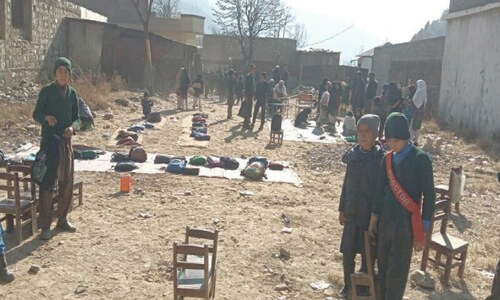PESHAWAR: The Election Commission of Pakistan (ECP) will launch a special campaign in 79 districts across the country by the end of the current month to register women as voters to end the growing disparity between the male and female voters.
Currently, there are around 12.17 more male voters than women female voters.
Officials of the ECP, including additional secretary Zaffar Iqbal and additional director general (gender affairs) Nighat Siddique, told a media workshop here on Wednesday that in the campaign, mobile registration vans of Nadra (National Database and Registration Authority) would visit 79 districts for preparing computerised national identity cards of women on the basis of which they would be registered as voters.
They said according to the electoral rolls, out of a total of 97.022 million registered voters, 54.598 million were male voters (56 percent) and 42.424 million were female voters (44 percent).
Officials say those involved in disenfranchisement of women to face action
The officials said the ECP had also been making efforts for electoral gender mainstreaming and that under a new law, any person involved in disenfranchisement of women would be punishable up to three years imprisonment and fined Rs100,000.
The event was organised by the ECP to highlight the recently enacted Elections Act, 2017, and the steps taken by it for ensuring free, fair and transparent elections in future.
Spokesman for the commission Haroon Shinwari moderated the programme and answered queries of the participants.
He said in case of any eventuality, the ECP was prepared to hold polls before time.
Mr Shinwari said a major hurdle in that respect was the delimitation of constituencies in light of national census report as the ECP needed at least six months for that exercise, which could be possible after receiving final report from Pakistan Bureau of Statistics.
“To avoid rigging, special watermarked ballot papers will be used in the 2018 general elections,” Mr Zaffar Iqbal said, adding that the election staff appointed for election duties from different department would also take oath prior to the polls for impartially performing duty.
Explaining the role of ECP in the electoral reforms, he said the commission had constituted a legal framework committee (LFC) in 2010 for comprehensive review of existing electoral laws and its unification. He added that the ECP had presented a draft Unified Election Bill prepared by LFC to the Parliamentary Committee on Electoral reforms in Aug 2014.
The official said the Elections Act, 2017, was enacted on Oct 2 and through it eight of the existing election laws were unified including the Electoral Rolls Act, the Delimitation of Constituencies Act, the Senate (Elections) Act, the Representation of People Act, the Election Commission Order, Conduct of General Election Order, Political Parties Order and the Allocation of symbols Order.
He said apart from government servants, the facility of postal ballot had also been extended to around 0.2 million voters with disability.
“Under Section 55 of the new law, the election officials appointed or deputed to perform duties in connection with an election should be under control of the ECP. The commission has been authorised to initiate and finalise disciplinary action and impose penalty against any election official for any act of misconduct,” he said.
ECP director general (elections) Yousaf Khattak said at least two months before the general elections the ECP had to appoint district returning officers, returning officers and assistant returning officers, who could be officials of the commission or could be taken from the executive or judiciary.
He said under the Constitution, general elections had to be held within 60 days of completion of tenure of an assembly.
The official said the National Assembly and Punjab Assembly would complete its five-year term on May 31, 2018, whereas the three other provincial assemblies would complete it on May 28, 2018.
Under the new law, he said a polling station could be set up for maximum 1200 voters whereas there should be a polling booth for maximum 300 voters.
He added that the ECP had already surveyed polling stations and had conveyed to the chief secretaries of the provinces about the missing facilities there including toilets, potable water and lighting system.
Director (MIS) Babar Malik said a voter could be registered on basis of his or her permanent or temporary address mentioned in the CNIC.
He said the CERS (Computerised Electoral Rolls System) is based on Civil Registry Database of Nadra.
“We are expecting that until 2018 general elections, the number of registered voters will increase to 103-104 million,” he said.
He said under the new law, any candidate or his agent could acquire from the ECP the electoral rolls carrying photos of the voters.
Some participants observed that people had apprehensions that electoral rolls carrying photos of female voters might be misused and it could discourage registration of female voters.
Published in Dawn, November 16th, 2017















































Dear visitor, the comments section is undergoing an overhaul and will return soon.